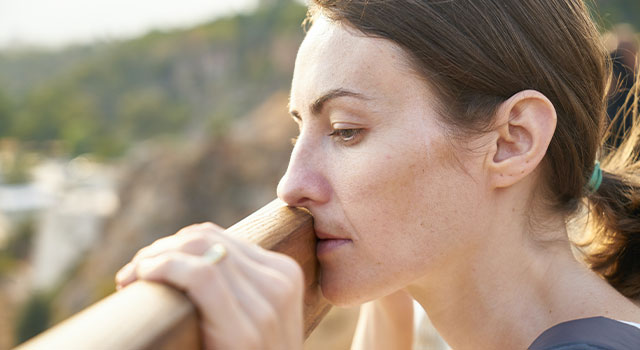 Depression is a serious illness that impacts a person's mood and emotional well-being. It creeps into all areas of a person's life, and can become life-threatening if left untreated.
Depression is a serious illness that impacts a person's mood and emotional well-being. It creeps into all areas of a person's life, and can become life-threatening if left untreated.
Not only does depression impact mental health; it can manifest as physical symptoms, too, like insomnia, chronic pain and inflammation, weight loss or gain and heart problems, among others. These physical problems can worsen depressive thoughts — sometimes leading to a vicious cycle.
Interestingly, many patients with depression also suffer from severe dry eye symptoms. The question is, how are these two conditions related?
What is Dry Eye Syndrome?
Dry eye syndrome, also known as dry eye disease, is a chronic condition that results from inadequate lubrication of the eyes. Ocular hydration is crucial when it comes to keeping your eyes healthy and your vision clear. Your tears are responsible for maintaining this necessary hydration, and in healthy eyes fulfill their unique mission each time you blink.
Your tear film is made up of three layers, consisting of oil, water and mucus. If any of these layers become compromised, inadequate tear quality or insufficient tear quantity can result and lead to a host of uncomfortable dry eye symptoms.
The most common dry eye symptoms include:
- Dry eyes
- Red or irritated eyes
- Itchy eyes
- Gritty eyes
- Light sensitivity
- Blurry vision
Can Depression Cause Dry Eye (or Vice-Versa)?
This is what researchers are trying to find out.
In a March 2022 study published in JAMA Ophthalmology, researchers examined the link between depression and severe dry eye symptoms. The study followed 535 dry eye patients for an entire year.
After a year, the patients who tested positive for depression had more severe dry eye symptoms than the patients who didn’t have depression. Their symptoms were measured based on the Ocular Surface Disease Index (OSDI), Brief Ocular Discomfort Index and composite dry eye disease sign score.
Additionally, severe depression was associated with more severe dry eye symptoms at baseline, six months, and one year.
The study concluded that depression was associated with more severe dry eye symptoms, which suggests that among patients with moderate to severe dry eye syndrome, those with depression may be likely to have more severe dry eye symptoms.
The researchers said further research is needed to learn exactly why people with depression have more severe dry eye symptoms than those without depression.
Could the sometimes debilitating symptoms of dry eye syndrome actually cause depression and anxiety?
A 2016 dry eye study published in Nature concluded that chronic discomfort and pain from dry eye symptoms can negatively affect the cognitive processes, sleep, mood and mental health. The researchers urged eye doctors to be aware of the higher incidence of dry eye syndrome in people with depression, whatever the underlying cause.
Can Antidepressants Cause Dry Eye Symptoms?
Yes. Antidepressants have been shown to increase dryness in the body, including the eyes. These medications work by blocking signals between nerve cells, which can result in insufficient tear production and dry eye syndrome.
If you’re taking an antidepressant, be sure to inform your eye doctor during your consultation.
How We Can Help
At Rosen Optometry Inc. in St. Louis, we recognize that some of our patients that come in with dry eye symptoms may be suffering from depression.
We’ll diagnose the cause of your dry eye symptoms and offer the most effective dry eye treatments to give you the relief you’re searching for.
Contact us today to schedule a dry eye assessment and take the first step towards regaining your quality of life.
Q: Who is affected by dry eye syndrome?
- A: While dry eye syndrome is most common in adults over 50, it can occur at any age. The following factors can increase your risk of dry eye:
- Aging
- Hormonal changes
- Medical conditions such as Sjogren’s syndrome and rheumatoid arthritis
- Prolonged screen time
- Living in a dry, dusty or windy environment
- Eye allergies
- Blepharitis or meibomian gland dysfunction
- Certain medications, such as decongestants, antihistamines, antidepressants, hormone replacement therapy
- Vitamin A deficiency
Q: How can you reduce your risk of dry eye?
- A: While some dry eye risk factors can’t be avoided completely, making some lifestyle changes can help. Practice these recommended tips:
- Use a humidifier to add moisture to the air
- Wear wraparound sunglasses outdoors to protect your eyes from harsh winds
- Take frequent screen breaks and blink often while using your digital device.
- Quit smoking
- Use lubricating eye drops
- Consume a healthy diet including omega 3 and drink plenty of water.
- Have regular eye exams

